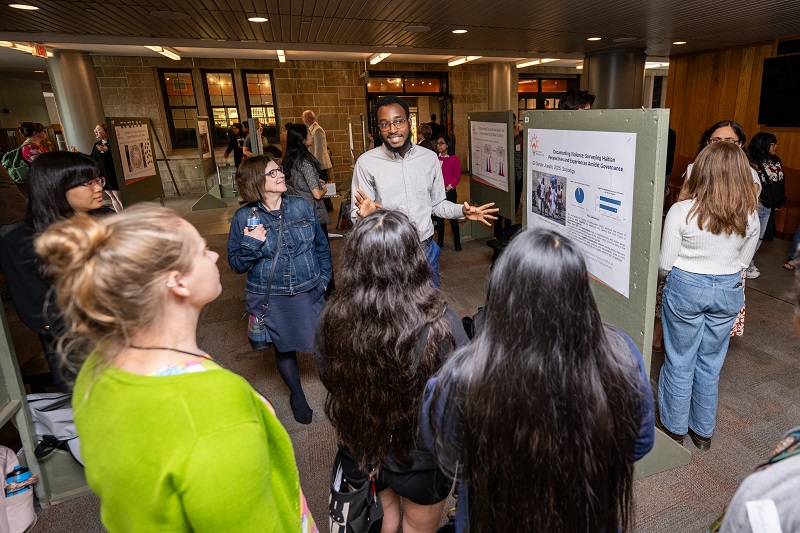Tenth Annual Princeton Research Day Offers Abundant Learning Opportunities
RESEARCH DAY: About 150 undergraduate, graduate school, and postdoc researchers will be presenting their discoveries at the 10th Princeton Research Day to be held in Frist Campus Center at Princeton University from 12 to 3:30 p.m. on May 8. The event is free, interactive, and open to the public. (Princeton University, Sameer A. Khan/Fotobuddy)
By Donald Gilpin
With about 150 undergraduates, graduate students, and postdocs presenting and several hundred curious spectators in attendance, the 10th annual Princeton Research Day (PRD) on May 8 will afford everyone a glimpse of some of the research that’s happening at Princeton University and a chance to learn about something they didn’t know before.
Taking place at the University’s Frist Campus Center from 12 to 3:30 p.m., the event will be free and open to the public, and “a very interactive session,” according to Pascale Poussart, who is the University’s director of undergraduate research and one of the founders and organizers of PRD.
“It’s a celebratory event,” said Poussart. “Members of the public will be able to ask questions directly to the presenters. People can expect projects and presentations from across the four divisions — engineering, natural sciences, social sciences, and arts and humanities — and there will be popcorn involved.”
Early submissions for the May 8 showcase of research projects include a student playwright’s “choose-your-own adventure” style interactive production with collaborative storytelling; a student who repaired his grandmother’s old player piano, merging technology of the past with a modern engineering solution that allows players to use phone apps on the device; a project from the Baby Lab that examines the brain activity of children and caregivers to investigate how infants and toddlers learn language so quickly; the project of a team of undergraduate researchers who have tracked the resource usage of ChatGPT to study how different AI users see the environmental impact of their ChatGPT usage; and much more.
April 30 is the final submission deadline for award consideration.
“It’s meant to be a very interactive event where the presenters are asked to talk about their work to a broad public,” said Poussart. “They’re not talking to other experts in the field. They have to communicate clearly and effectively. They have to be engaging in describing their research and why it’s important and why we should care that they are doing research on this topic or that topic. Why is it important?”
She pointed out that undergraduate presenters are likely to offer projects based on their senior thesis or a research internship they did last summer or a writing seminar they took where they wrote a research paper, and graduate students may present on their doctoral research, while postdocs will likely be presenting the research they are currently working on.
“For the presenters it’s an opportunity to practice their communication skills, to interact with audience members, and to answer questions,” said Poussart. “I think now more than ever it’s very important for researchers to be able to communicate broadly about why they do the research that they do, why it’s important, why we should care.”
Poussart emphasized that there are many ways for the general public to participate in PRD. On the weekend before the event, beginning at noon on May 2, all the three-minute video submissions describing the presenters’ research will be published online. Throughout that weekend members of the public can view the videos on the PRD homepage, and voting for the FitzRandolph Gate Award for the fan favorite video will be open from noon on Friday, May 2 to 9 a.m. on May 5.
On the Thursday, May 8 Research Day, the showcase of presenters takes place from noon to 1 p.m., where the audience can speak with the researchers and vote for their favorite poster presentation. The event continues with a reception from 1 to 2:30 p.m., followed by the awards celebration from 2:30 to 3:30 p.m., which will include viewing of award-winning videos and Q&As with the presenters. A panel of PRD judges will evaluate the submissions for prizes and awards of up to $1,500.
Poussart noted the intergenerational, eclectic nature of PRD, with a mix of ages and academic levels and an amalgamation of disciplines. “It’s important to have all these populations presenting side by side,” she said. “We don’t put chemistry presenters in one area and engineers in another. It’s purposefully not organized by discipline so that wherever your path leads you, you’ll come across some unexpected projects.”
She went on to highlight the importance of celebrating the students’ accomplishments. “In my mind the measure of success for the event is how much of an audience we can give to our students, because the students have worked really hard on this research,” she said. “They care deeply about their work, and when we see a room full of attendees who are really curious and wanting to learn and giving these students an opportunity to share their work, share their passion, to me that makes for a successful event.”
She added, “It is honestly my favorite day of the year. It’s a really fun day when you’re sure to learn something new.”
To see and vote on the presenters’ videos, beginning about noon on May 2, or to register to attend PRD, which is free and open to the public on May 8, or to learn more about the event, visit researchday.princeton.edu.


